

CIPL Launches Project at Amsterdam Workshop on EU General Data Protection Regulation Implementation : : Privacy & Information Security Law Blog. On March 16, 2016, the Centre for Information Policy Leadership (“CIPL”) at Hunton & Williams LLP will co-host a one-day workshop in Amsterdam, Netherlands, together with the Dutch Ministry of Security and Justice, to kick off a new long-term CIPL project on the implementation of the EU General Data Protection Regulation (“GDPR”).
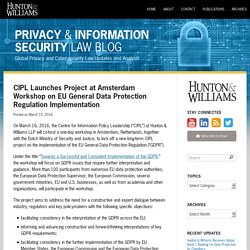
Under the title “Towards a Successful and Consistent Implementation of the GDPR,” the workshop will focus on GDPR issues that require further interpretation and guidance. More than 100 participants from numerous EU data protection authorities, the European Data Protection Supervisor, the European Commission, several government ministries, EU and U.S. businesses, as well as from academia and other organizations, will participate in the workshop. The project aims to address the need for a constructive and expert dialogue between industry, regulators and key policymakers with the following specific objectives: Createsend. The new EU General Data Protection Regulation - what do you need to know? On the 17th December 2015, the European Parliament's Civil Liberties, Justice and Home Affairs [LIBE] Committee voted resoundingly in favour of the new General Data Protection Regulation (GDPR).
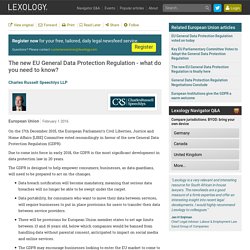
Due to come into force in early 2018, the GDPR is the most significant development in data protection law in 20 years. The GDPR is designed to help empower consumers; businesses, as data guardians, will need to be prepared to act on the changes. Optanon GDPR Compliance Manager. We have been working for several months now on a new platform to help organisations assess their readiness to comply with the EU General Data Protection Regulation (GDPR).
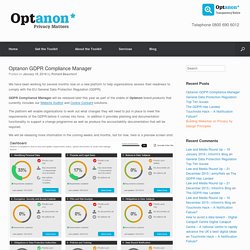
GDPR Compliance Manager will be released later this year as part of the stable of Optanon brand products that currently includes our Website Auditor and Cookie Consent solutions. The platform will enable organisations to work out what changes they will need to put in place to meet the requirements of the GDPR before it comes into force. In addition it provides planning and documentation functionality to support a change programme as well as produce the accountability documentation that will be required. We will be releasing more information in the coming weeks and months, but for now, here is a preview screen shot. If you would like to know more about how Optanon GDPR Compliance Manager might help you, and arrange a demo, please give us a call or drop us an email.
EU and US divisions over data protection threaten agreement. Persistent disagreements between the United States and the European Union over the treatment of personal data threaten to undermine international standards.
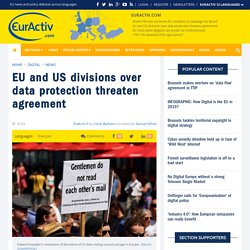
EurActiv France reports. Consumer protection or fundamental rights? Phil Lee - Fieldfisher. Stewart Room PwC. Eduardo Ustera - Hogan Lovells. Sign In. Political agreement announced on new European General Data Protection Regulation: Christmas come early? The European Commission announced this week that the trilogue negotiations between the European Commission, Council and Parliament have resulted in a political agreement.

This is the first stage in the implementation of the Regulation. The consolidated text is now waiting for confirmation from the Member States in the Council and a further vote by the full Parliament in January, after having been approved by the Parliamentary Committee on Civil Liberties, Justice and Home Affairs this morning (resulting in an offer of champagne all round!). As with all negotiated documents, the Regulation isn’t perfect. French data protection authority issues guidance on personnel data. The French Data Protection Authority (CNIL) published practical guidelines to help employers and recruiters manage personal data of employees and job candidates ("personnel data"), in addition to the Work & Personnel Data Guidance Sheet and Guide for Employers and Employees.

Recruitment During the recruitment process, employers should only collect information that may help them assess the candidate's ability to perform the job duties, such as their qualification and experience. Employers are not allowed to ask for the job candidate's social security number or information about their immediate family, political opinion, or trade union membership. Hiring Employers may collect additional information at the hiring stage, or information necessary for complying with a legal obligation. Employees should have access to comments employers recorded about them which must remain objective and proportionate.
Access Data Protection Rights Candidates and employees should be informed of: What US Companies Need to Know About New EU Data Protection Rules. Getting To Know the GDPR Blog Series. Getting To Know the GDPR Blog Series Fieldfisher’s Privacy and Information Law Blog offers this series of blog posts about the proposed EU General Data Protection Regulation.
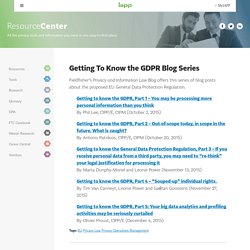
Getting to know the GDPR, Part 1 – You may be processing more personal information than you think By Phil Lee, CIPP/E, CIPM (October 2, 2015) Getting to know the GDPR, Part 2 – Out-of-scope today, in scope in the future. What is caught? By Antonis Patrikios, CIPP/E, CIPM (October 20, 2015) Getting to know the General Data Protection Regulation, Part 3 – If you receive personal data from a third party, you may need to “re-think” your legal justification for processing it By Marta Dunphy-Moriel and Leonie Power (November 13, 2015) Getting to know the GDPR, Part 4 – “Souped-up” individual rights. Getting to know the GDPR, Part 5: Your big data analytics and profiling activities may be seriously curtailed By Olivier Proust, CIPP/E (December 4, 2015) Related. Final text of the EU Regulation compared with draft Serbian law. A Primer on the GDPR: What You Need to Know.
Now that it’s been approved by the EU Parliament’s Civil Liberties Committee, Europe’s General Data Protection Regulation (the “GDPR” or the “Regulation”) is well on its way to replacing the 20-year-old Data Protection Directive (the “Directive”) as the EU’s omnibus data protection law.
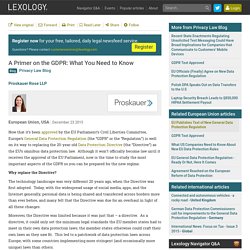
Although it won’t officially become law until it receives the approval of the EU Parliament, now is the time to study the most important aspects of the GDPR so you can be prepared for the new regime. Why replace the Directive? The technology landscape was very different 20 years ago, when the Directive was first adopted.
Today, with the widespread usage of social media, apps, and the Internet generally, personal data is being shared and transferred across borders more than ever before, and many felt that the Directive was due for an overhaul in light of all these changes. Moreover, the Directive was limited because it was just that – a directive. New EU Data Protection Regime Set to Have Big Impact. After nearly four years of negotiations, the European Parliament, Council of Ministers, and European Commission have reached an agreement about overhauls to the EU data protection regime.
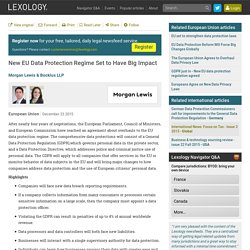
The comprehensive data protections will consist of a General Data Protection Regulation (GDPR),which governs personal data in the private sector, and a Data Protection Directive, which addresses police and criminal justice use of personal data. The GDPR will apply to all companies that offer services in the EU or monitor behavior of data subjects in the EU and will bring major changes to how companies address data protection and the use of European citizens’ personal data. Highlights Next Steps. Ready or not, here it comes - a GDPR game plan. Silence before the storm. EU Agrees To International Extension of Data Protection in Midst of Safe Harbor Negotiations. GDPR: from directive to regulation. Eur-lex.europa.
New EU age limit paves the way for data ethical social media - Dataethical Thinkdotank. News: The long-awaited EU data protection reform adopted by the Europan Union this week, stipulates among others that companies cannot process the data of children and young people under the age of 16 without their parents’ consent.
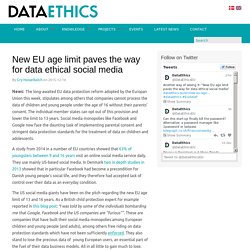
The individual member states can opt out of this provision and lower the limit to 13 years. Social media monopolies like Facebook and Google now face the daunting task of implementing parental consent and stringent data protection standards for the treatment of data on children and adolescents. A study from 2014 in a number of EU countries showed that 63% of youngsters between 9 and 16 years visit an online social media service daily. They use mainly US-based social media. In Denmark two in depth studies in 2013 showed that in particular Facebook had become a precondition for Danish young people’s social life, and they therefore had accepted lack of control over their data as an everyday condition. GDPR - A game changer for the digital economy. A legal tsunami of overwhelming proportions. A ground breaking piece of legislation. A sweeping digital-privacy regime. A strict new legal framework that will have ripple effects globally.
10 Implications of the New EU General Data Protection Regulation (GDPR) - TeachPrivacy. Last week, the EU issued the General Data Protection Regulation (GDPR), a long-awaited comprehensive privacy regulation that will govern all 28 EU member countries. Clocking in at more than 200 pages, this is quite a document to digest. According to the European Commission press release: “The regulation will establish one single set of rules which will make it simpler and cheaper for companies to do business in the EU.” GDPR Text Approved. Following yesterday’s announcement that European officials had agreed on the language of the EU’s new General Data Protection Regulation (“GDPR” or “Regulation”), today the EU Parliament’s Civil Liberties Committee approved the text of the GDPR.
The GDPR isn’t law yet, as it still needs to be approved by the EU Parliament next month. However, the Parliament is expected to approve the Regulation, which would then go into force in 2018. A Primer on the GDPR: What You Need to Know. Now that it’s been approved by the EU Parliament’s Civil Liberties Committee, Europe’s General Data Protection Regulation (the “GDPR” or the “Regulation”) is well on its way to replacing the 20-year-old Data Protection Directive (the “Directive”) as the EU’s omnibus data protection law.
Although it won’t officially become law until it receives the approval of the EU Parliament, now is the time to study the most important aspects of the GDPR so you can be prepared for the new regime. Why replace the Directive? The technology landscape was very different 20 years ago, when the Directive was first adopted. Today, with the widespread usage of social media, apps, and the Internet generally, personal data is being shared and transferred across borders more than ever before, and many felt that the Directive was due for an overhaul in light of all these changes. Moreover, the Directive was limited because it was just that – a directive. The GDPR is meant to solve this problem. Territorial scope. EU Officials (Finally) Agree on New Data Protection Regulation.
2015_12_15-GDPR_final_outcome_trilogue_consolidated_text. EU agreement on data protection reform - MacRoberts LLP. Podcast: How To Interpret the New GDPR. At long last, a compromise text is available and it looks like the four-year quest for a new data protection regime in the European Union is coming to a close. Act Now Training. EU Tech Briefing: PNR, PNT, GDPR and Digital Single Market.